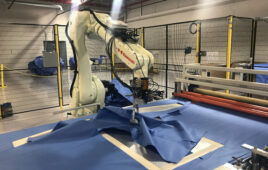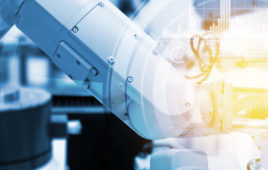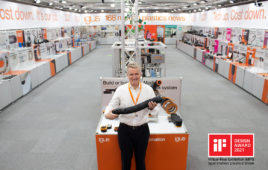 Robotics, assembly and manufacturing experts are currently converting industrial production lines in record time to help cope with the corona pandemic. New ideas are being swiftly implemented to reduce bottlenecks in the supply of protective face masks and to bring test procedures to robot speed. Wherever possible, the robotics and automation specialists are working to support people with smart machine power.
Robotics, assembly and manufacturing experts are currently converting industrial production lines in record time to help cope with the corona pandemic. New ideas are being swiftly implemented to reduce bottlenecks in the supply of protective face masks and to bring test procedures to robot speed. Wherever possible, the robotics and automation specialists are working to support people with smart machine power.
“The flexibility and creativity of the companies has overwhelmed us,” said Patrick Schwarzkopf, Managing Director of Germany’s VDMA Robotics + Automation Association. “Initiatives and new ideas are coming from all sides to use automation technology to overcome the corona crisis. The companies are working at breathtaking speed. A can-do spirit is in the air.”
Automotive assembly goes into respiratory protection
Machine manufacturer PIA Automation from Amberg, Germany, for example, normally manufactures fully automated production systems for the automotive industry, but also counts medical technology companies among its customers. Within a few weeks after the outbreak of the crisis, PIA initially revamped two existing production lines at its site in China for fully automated production of up to 150,000 protective masks per day. With the know-how from this pilot project, the company is now working on numerous follow-up orders and has also started manufacturing new assembly lines in Germany to produce face masks. The first delivery is scheduled for the beginning of May. This will enable more than 1 million respiratory masks to be produced per day.
The project is not a one-off: Mechanical engineering company Ruhlamat from Marksuhl, Germany has also put its foot down and rapidly developed a production line for disposable surgical masks. The filter material for respiratory protection can be processed flexibly depending on the required safety levels.
The machine builders at Ruhlamat and PIA Automation are thus using their many years of experience in high-speed assembly automation to ramp up the required production of respiratory protection masks to the required volume.
Drive-through for corona mass testing
Unlike medical staff, robots are immune to the virus. Therefore, German automation provider Boka Automatisierung came up with the idea of a fully automated system reminiscent of the customer experience in a drive-through restaurant which can be used by any driver for a corona test. Using a tablet, the driver identifies through the side window of the car and a robotic arm hands over the test tube. A video tutorial guides the sample collection. The test tube is then automatically returned. Each test participant is then informed by phone of the result of a possible coronavirus infection.
Robot sorts 3,000 blood samples per day
The sharp increase in COVID-19 testing procedures requires numerous blood tests to be performed. This process — traditionally performed manually by laboratory technicians in clinics — is very time-consuming and monotonous: an ideal process to be automated.
The Aalborg University Hospital in Denmark already has a laboratory that benefited from automation even before the corona crisis. Every day, up to 3,000 blood samples are carefully sorted by two KUKA robots in the largest hospital in the North Jutland region. The employees are relieved of an enormous amount of work and can concentrate on more sophisticated activities instead of performing vast amounts of routine tasks.
Robot James helps with visitor bans in care homes
RobShare, a company of the Hahn Group in Rheinböllen, Germany, helps residents of nursing homes keep contact with family members during the Coronavirus-induced visiting ban. James is the name of the communication robot visiting people in the quarantined rooms and connecting family members simply via video conference. RobShare offers rental of the robots free of charge. “We don’t earn a cent from this campaign, we just have to make sure that our basic costs are largely covered,” said Konstantin Dick from the HAHN Group. “That is why we have already started to look for sponsors so that the campaign can be offered completely free of charge for the care homes.
More examples of how robotics and automation are helping us to cope with the coronavirus pandemic (and press photos) can be found here.
VDMA Robotics + Automation
vdma.org
Filed Under: Fighting COVID-19




